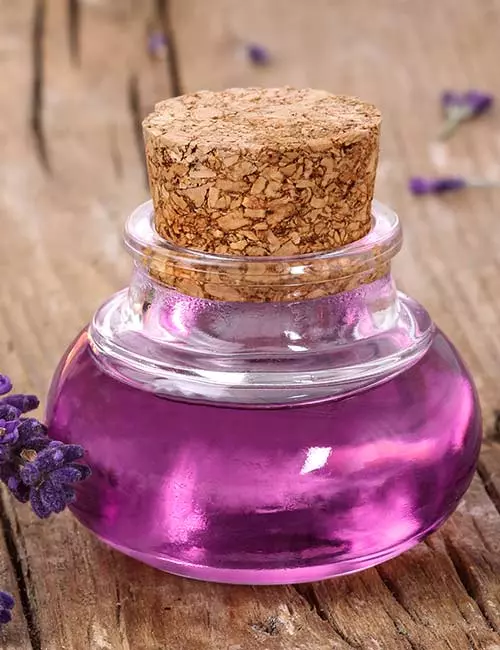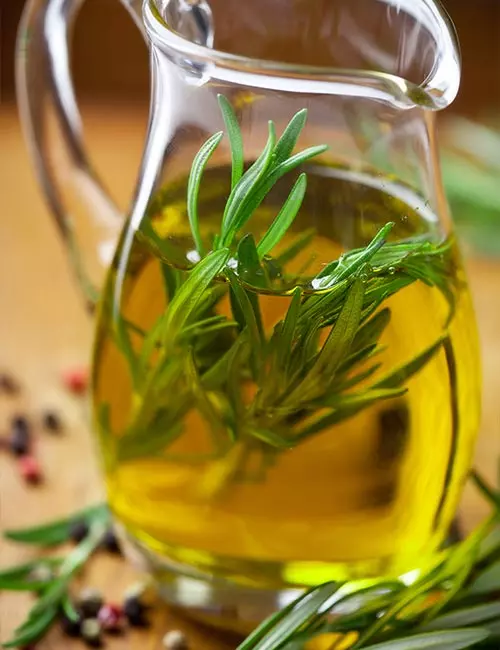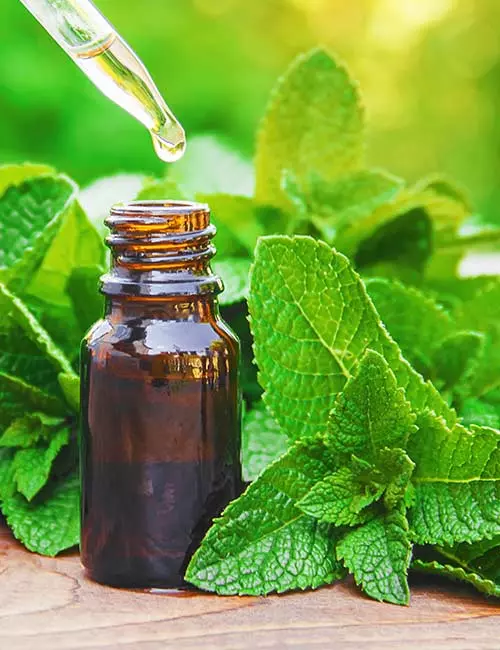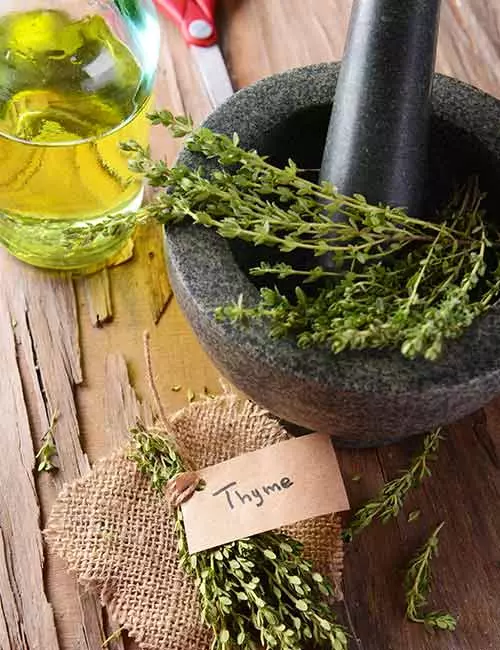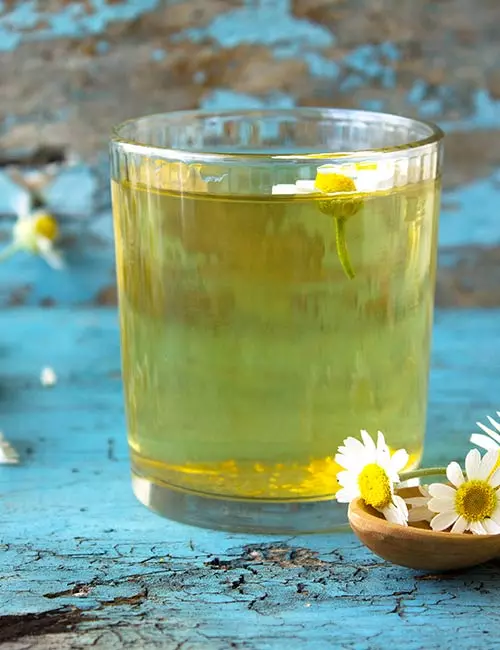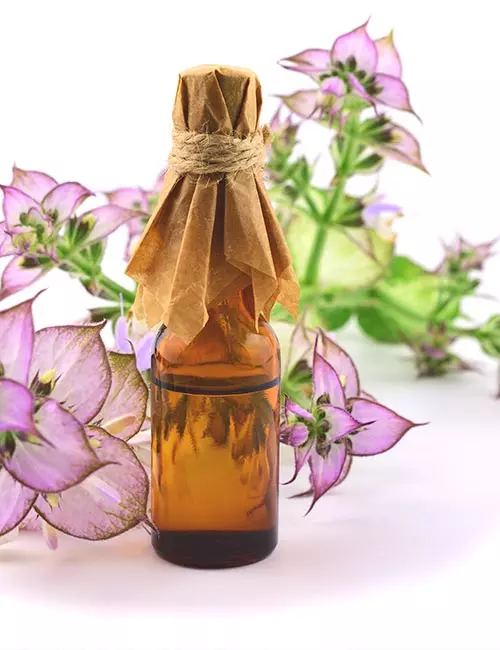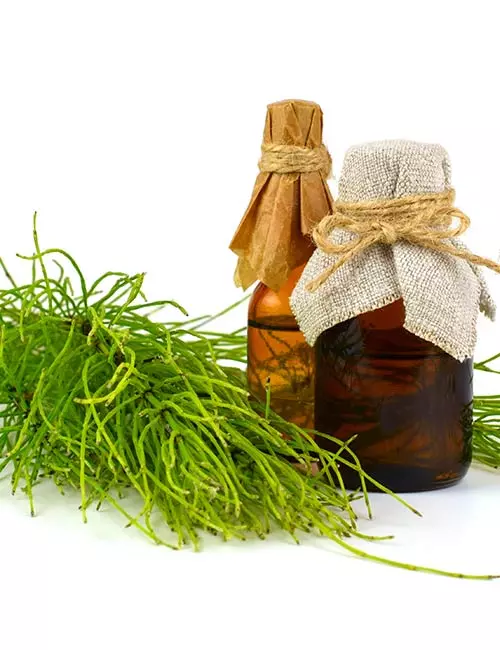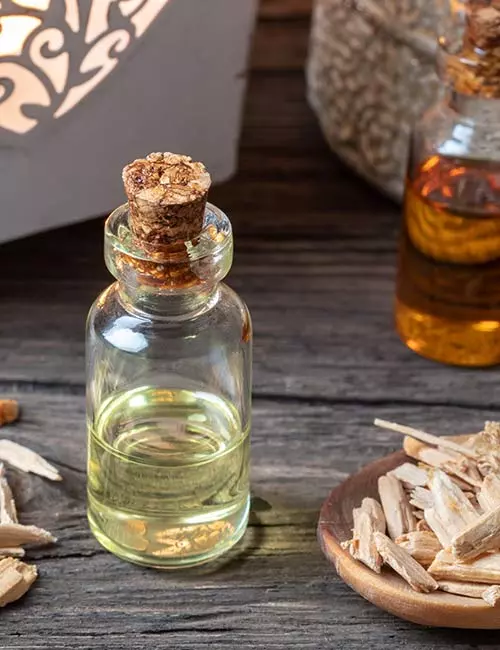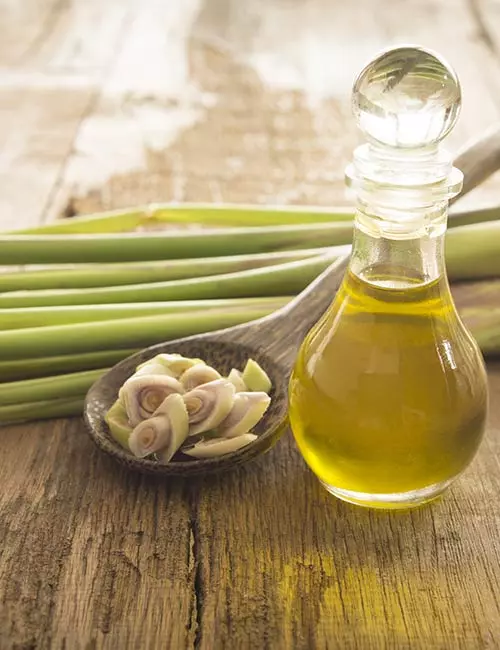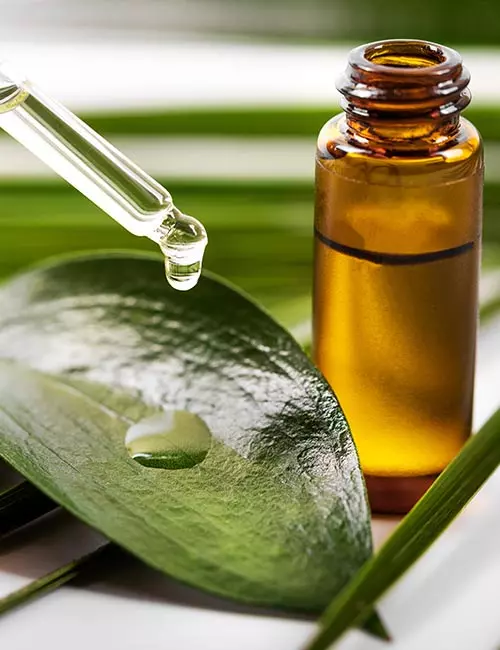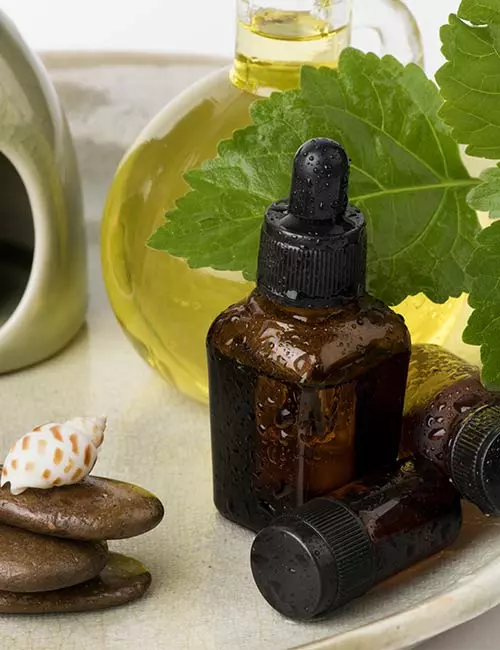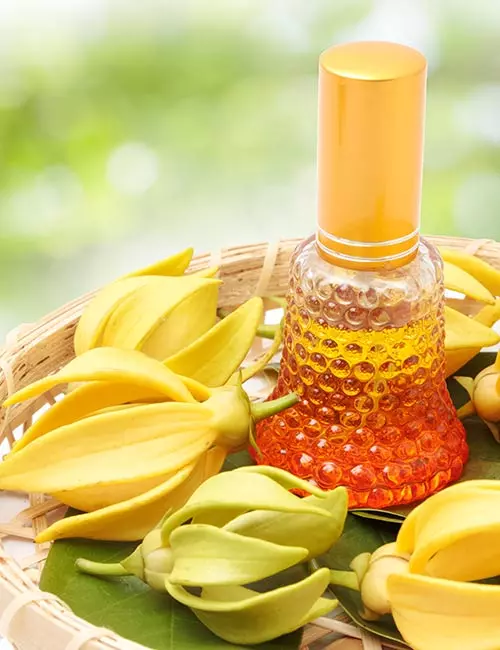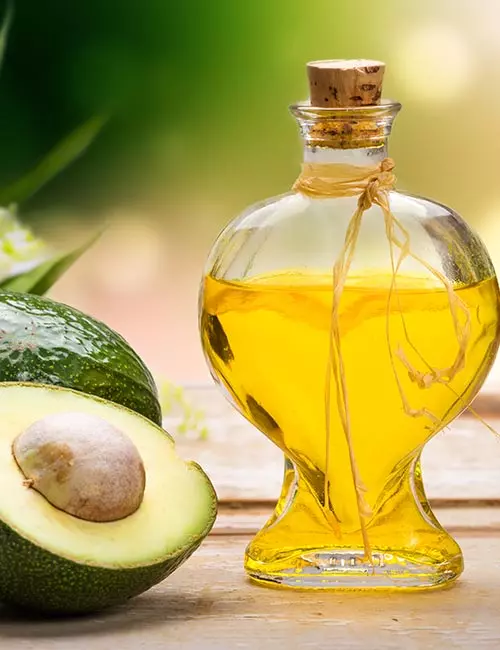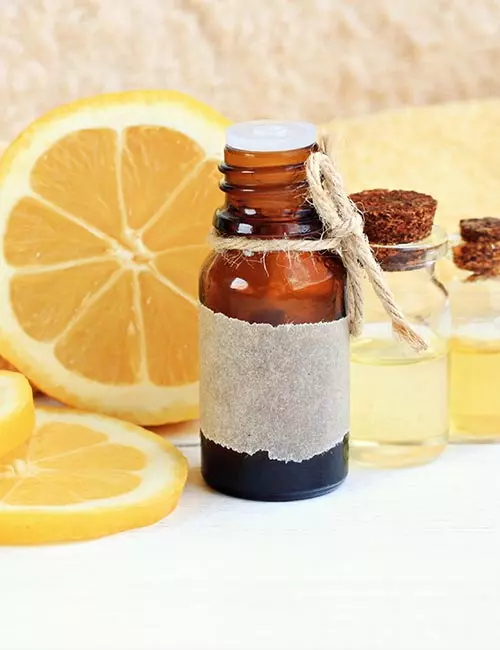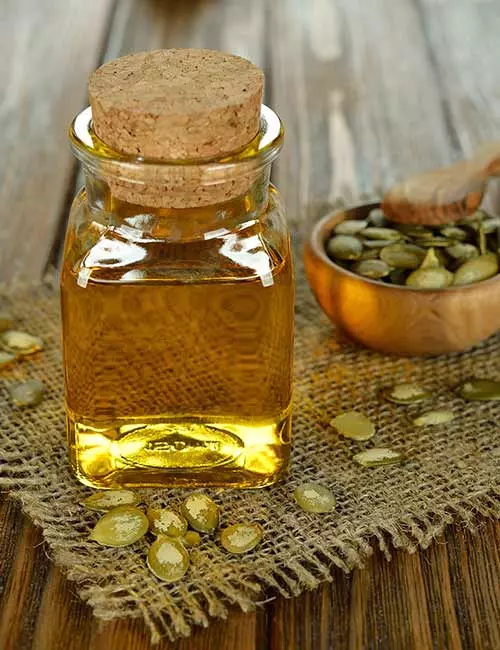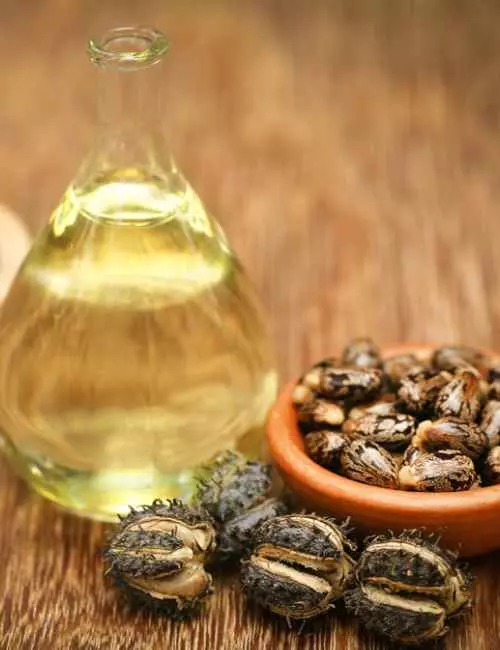We will also find out how essential and regular oils differ, what carrier oils are, and the tips to use these oils effectively for hair to reap maximum benefits. So, let us get started.
Essential Oils Vs. Carrier Oils
A carrier oil is derived from plants, seeds, or nuts, while an essential oil is distilled from leaves, roots, or rare botanicals. Essential oils have a concentrated aroma and carrier oils don’t. Essential oils are known to be volatile, while carrier oils are pure oils. Essential oils cannot be used directly on your skin or hair, while carrier oils are safe for direct application. Essential oils are extraordinarily potent and can be stored for a long time. Carrier oils, on the other hand, go rancid after a while.
Essential oils have started gaining popularity for the various benefits they offer for hair. Check them out in the next section!
Benefits Of Essential Oils For Hair
1. Nourish Hair Follicles
Essential oils seep into your hair follicles to nourish them and aid hair growth.
2. Balance Scalp Sebum
Essential oils cleanse your scalp and remove excess sebum, thereby promoting new hair growth.
3. Strengthen Your Hair
Essential oils contain nourishing properties that repair and heal damaged cuticles, leading to thicker and fuller looking hair.
Other Benefits Of Essential Oils
Regulate blood circulation in the scalp Protect hair from free radicals Kill microorganisms and scalp-infecting germs Add shine to your hair Reopen dormant follicles Prevent premature graying Improve hair texture
A survey to investigate the effects of standardized scalp messages on patients with androgenic alopecia was completed by 340 respondents. 68.9% of them reported hair loss stabilization and regrowth after a daily standardized scalp massage of 11-20 minutes. Essential oils can be used with carrier oils for this standardized scalp massage. Fascinating! Who knew essential oils could do wonders for your hair? So, it’s time you added them to your hair care routine. We’ve compiled a list of the best essential oils for hair to help you out. Check them out!
16 Best Hair Growth Oils for Every Type of Hair
1. Lavender Essential Oil
You Will Need
4 to 5 drops of lavender oil 3 tablespoons of olive or coconut oil
Time 5 hours, or leave it on overnight to get the most of its healing powers. How To Apply Why This Works This sweet-smelling flower is known for relieving stress and anxiety (1). But that’s not all! It is one of the very few oils that works on all hair types. According to some studies, massaging lavender oil with other herbs and carrier oils on your scalp may help with hair loss (1). It moisturizes the scalp and balances sebum secretion. A study showed that lavender oil significantly improved the depth of hair follicles, thus contributing to the growth of new cells in female mice (2). Its anti-inflammatory, antiseptic, and antinociceptive properties also make it a compelling choice for treating alopecia areata (2). It can also be used to fight bacteria and fungus (3).
2. Rosemary Essential Oil
You Will Need
4 to 5 drops of rosemary oil 4 tablespoons of olive oil or coconut oil (you can heat it if you want) 2 to 3 drops of cinnamon oil (optional)
Time 3 hours How To Apply Why This Works Rosemary oil is known for its pungent aroma. It improves hair growth and thickness and promotes a healthy scalp. Research shows that rosemary helps increase the hair count and treats itchiness on the scalp (4). This woody natural herb improves blood circulation in the scalp and stimulates hair follicles. (5). It is packed with antifungal, insecticidal, and antioxidant properties that help prevent baldness, premature graying of hair, and dandruff. It also promotes blood circulation in your scalp and stimulates new hair growth.
3. Peppermint Essential Oil
You Will Need
3 drops of peppermint oil 2 tablespoons of coconut oil 1 tablespoon of olive oil
Time 4 hours How To Apply Why This Works Peppermint oil is packed with conditioning and nourishing properties. The application of peppermint oil for four weeks saw positive hair growth effects in mice (6). Peppermint oil induces rapid hair growth from the roots and strengthens the hair follicles. Its antiseptic, antifungal, and antibacterial properties can heal scalp inflammation and treat dandruff and head lice. It prevents premature graying of hair by protecting your natural hair color. The pungent aroma of peppermint oil also enhances energy, lifts your mood, and relieves stress (7).
4. Thyme Essential Oil
You Will Need
2 drops of thyme essential oil 2 to 3 tablespoons of olive oil
Time 20 minutes How To Apply Why This Works Thyme is a highly aromatic herb that is popular in the culinary world. Studies show that thyme helps treat alopecia areata when mixed with other powerful essential oils (8). It increases the blood flow to the scalp and promotes new hair growth. Thyme contains a potent constituent called thymol that treats inflammation (9). Thus, the application of thyme oil can treat dandruff and other scalp-infections.
5. Chamomile Essential Oil
You Will Need
5 drops of chamomile essential oil 3 tablespoons of olive oil or jojoba oil
Time 4 to 5 hours, or you can even leave it overnight as it is non-greasy. How To Apply Why This Works This floral essential oil is great for healing and soothing your scalp. It is a popular choice in aromatherapy and the hair care industry. Scalp massage with oil increases blood flow to hair follicles, which, in turn, leads to an increased hair thickness (10). This nourishing oil prevents dryness and repairs the hair shafts, thus promoting fresh hair regrowth. It soothes itchiness on the scalp and treats skin inflammation (11).
6. Clary Sage Essential Oil
You Will Need
8 drops of clary sage oil 1 to 2 tablespoons of coconut oil
Time 30 minutes How To Apply Why This Works Clary sage regulates the secretion of sebum oil. It contains phytoestrogens that promote hair growth. It controls premature graying of hair. Massaging this oil on your scalp will help treat dandruff and reduce itchiness. It neutralizes hormone imbalance and helps fight hair loss. It also moisturizes your hair, making it soft and manageable.
7. Horsetail Plant Oil
You Will Need
2 drops of horsetail oil 2 drops of olive oil or jojoba oil
Time 20 minutes How To Apply Why This Works Also known as puzzlegrass, horsetail herb is usually taken as a supplement for healthy and natural growth of hair. Studies show that this plant is used as a natural remedy for stimulating hair growth. It helps fight hair loss and strengthens the hair follicles (12). Another study reports that horsetail contains a component called silica, which contributes to rapid hair growth (13). It also builds strength and prevents thinning of hair.
8. Cedarwood Essential Oil
You Will Need
3 drops of cedarwood essential oil 2 to 3 tablespoons of coconut oil
Time 20 minutes How To Apply Why This Works Cedarwood oil has a refreshing woody scent. When mixed with other essential oils, cedarwood oil was found to treat alopecia areata successfully (8). Its antifungal and antibacterial properties make it an excellent remedy for treating dandruff. It can promote hair growth and reduce thinning of hair. Cedarwood also helps balance sebum secretion, thus treating oiliness on the scalp. It fights scalp infection and improves the overall health of your hair.
9. Lemongrass Oil
You Will Need
10 drops of lemongrass oil Any shampoo or conditioner (in the amount that you use per wash)
Time 5 to 10 minutes How To Apply Why This Works Lemongrass is known for its healing properties. A study conducted in 2015 found that lemongrass helped clear dandruff significantly in just 7 days (14). It also clears bacteria and fungus and keeps your scalp free of infection. It strengthens your hair follicles and promotes healthy hair growth. It also soothes an irritated scalp and relieves headache.
10. Tea Tree Essential Oil
You Will Need
3 drops tea tree essential oil 2 tablespoons of coconut or olive oil
(OR)
8 drops of tea tree oil Any chemical-free shampoo
Time
For oil mix – 25 minutes For shampoo – 5 to 10 minutes
How To Apply Why This Works Tea tree oil has strong antifungal and antibacterial properties that help in treating dandruff, itchiness, and scaliness on the scalp (15). It eliminates dirt and keeps your scalp free of infection. A study reports state that tea tree oil can help in the treatment of androgenic alopecia and inflammation (16). Research also shows that 1% concentration of tea tree oil can kill head lice within 30 minutes (17).
11. Patchouli Essential Oil
You Will Need
2 to 3 drops of patchouli essential oil 2 tablespoons of argan oil
Time 2 hours How To Apply Why This Works This exotic plant has a minty fragrance. It is commonly used in perfumes for its strong and invigorating fragrance. It is packed with hydrating and moisturizing properties that can soothe a dry and flaky scalp. It offers anti-inflammatory and antifungal properties that may help resolve many scalp problems. A study states that patchouli oil, when mixed with other plant essential oils, removes fungus attached to the hair shaft effectively (18). It is one of the most potent herbs used in dermatology. A study shows patchouli oil helps treat scalp disorders, dermatitis, and oily scalp (19).
12. Ylang Ylang Essential Oil
You Will Need
4 to 5 drops of ylang-ylang essential oil 2 tablespoons of coconut or olive oil
Time 1 to 2 hours How To Apply Why This Works Ylang ylang is a tropical tree native to the Philippines. It stimulates sebum production and is ideal for those with dry scalp. It moisturizes the scalp and helps fight flakiness. It is a potent hair growth promoter. This essential oil is also useful in fighting lice (20). It prevents hair thinning and hair loss and repairs damaged hair to improve the hair texture. It has a sweet, musky fragrance that helps you relax and relieves stress.
13. Avocado Essential Oil
You Will Need
1 tablespoon of honey 4 drops of avocado essential oil 2 tablespoons of olive oil
Time 15 to 20 minutes How To Apply Why This WorksAvocado essential oil is great for getting healthy hair . It has anti-inflammatory and antioxidant properties that can help tame frizzy hair. The oil serves as an excellent moisturizer for dry and flaky scalp. It also helps in the recovery of damaged hair cells (21). It is rich in vitamins A, B5, and E, essential minerals, fatty acids, and biotin. This excellent oil strengthens your hair follicles and improves their vitality. It gets absorbed into your scalp effortlessly and soothes dry roots. The best thing about this oil is that it unclogs the roots and promotes healthy hair growth within days. While protecting your hair from damage, it also adds shine to your tresses and makes them soft and silky. It regulates blood circulation in your scalp and keeps a check on premature graying.
14. Lemon Essential Oil
You Will Need
4 to 5 drops of lemon oil 2 tablespoons of olive oil
(OR)
Add 8 drops of lemon oil in your shampoo and use it once a week
Time
For the oil mix – 2 hours For shampoo – 5 to 10 minutes
How To Apply Why This Works Lemon is known for its multiple medicinal benefits. Often stated as a rescuer of oily hair, lemon helps remove dirt, grime, and extra oil from your scalp. An animal study conducted on rabbits states that lemon oil has remarkable hair stimulation properties (22). Lemon contains a compound called limonene that helps nourish dry and frizzy hair. Its antifungal properties also assist in the removal of dandruff, bacteria, and lice. Since lemon is acidic, it helps clear the scalp and prevent clogging.
15. Pumpkin Seed Essential Oil
You Will Need
5 drops of pumpkin seed oil 2 to 3 tablespoons of olive oil or coconut oil
Time Overnight. How To Apply Why This Works Pumpkin seed essential oil is a rich source of antioxidants, minerals, fatty acids, and vitamin E. It is helpful for maintaining a clean and healthy scalp. It strengthens the follicles and clears scalp build-up and dead cells. Pumpkin seed oil has been found to combat androgenetic alopecia in men (23). It also contains phosphorus, manganese, and magnesium that promote healthy and luscious hair.
16. Castor Oil
You Will Need
2 tablespoons of castor oil 2 tablespoons of a carrier oil like coconut oil A shower cap or towel
Time: 1 hour or overnight How To Apply Why This Works The ricinoleic acid in castor oil and fatty acids in castor oil may help nourish the hair follicles and improve overall hair texture. Using castor oil for hair growth can be particularly effective, as the ricin present in castor oil may also protect the hair from infections, leaving it feeling smoother, healthier, and stronger (24). Those were our top 16 picks of oils for hair. Before you start using these oils, you need to know that since essential oils are potent, they have a few risks associated with them. Check out the next section to find out more.
Possible Risks Of Using Essential Oils
Using essential oils in large quantities can trigger headache and nausea. Thyme, lemongrass, and cinnamon essential oils should not be used on children. Certain powerful essential oils made of cinnamon, nutmeg, and sage can cause facial flushing, dizziness, and mucous membrane irritation. Citrus oils – like lemon, orange, and grapefruit – can cause skin damage and skin discoloration. Pregnant women need to be mindful of the dosage while using essential oils as it can affect the unborn child. Frequent use of citrus essential oils can damage your skin cells when exposed to the sun.
Find out about the top three essential oils for hair growth, which also help in combatting hair loss from the video below. Discover natural solutions for healthier and more vibrant hair that you can be proud to flaunt. What should I look for in essential oils? Look for the highest quality essential oils with organic ingredients. Check for their purity and make sure to buy ones that do not contain any carrier oils. How often should I use essential oils on hair? You can use essential oils (mixed in carrier oils) twice a week. Which essential oils should you avoid during pregnancy? Wintergreen, cinnamon, lemongrass, clary sage, thyme, and rosemary oils should be avoided during pregnancy.
